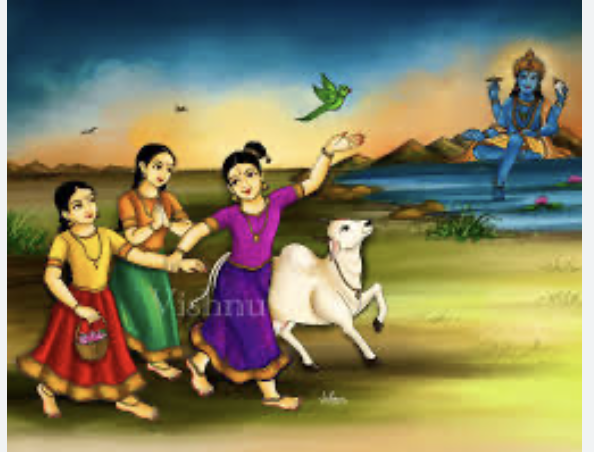Vedanta
Thirupavai Pasuram 12
Understanding Thirupavai Pasuram 12 Thirupavai, a sacred work of poetry written by the Tamil saint and poet Andal, is a collection of 30 verses dedicated to Lord Vishnu, specifically in His incarnation as Venkateshwara and Ranganatha. Each pasuram (verse) has deep philosophical meaning, intertwined with devotion, surrender, and the grace of Lord Vishnu. Pasuram 12 is one of the key verses of the work, where Andal continues to express her love and devotion towards the Lord while teaching us the virtues of service and humility.iption.
Madhavi
12/25/20243 min read


The Verse (Thirupavai Pasuram 12)
கோவிந்தா கோவிந்தா உத்தி எழுந்து போவிந்தா
நாவினால் ஓர் நம்பி நன்றாக பாடி வாடி
பூவினால் உந்தன் மாலைச் செருகி தொட்டிடாங்களே
ஏவனார் கோவில் நோக்கி புயங்காற்றாகத் தொய்த்திடு
Transliteration:
Kovindaa Kovindaa uthi ezhundhu poovindaa
Naavināl oru nampi nandraagā paadi vaadi
Poovinaal undhan maalaich cherugi thottidaangale
Evanaar kovil nokki puyangkāraaththāka thoyththidu.
Meaning of Pasuram 12
In this pasuram, Andal expresses a heartfelt plea to the devotees, instructing them to wake up early in the morning, with an intent of serving and offering their best to Lord Vishnu. She beautifully describes the process of devotional service and the joy that comes from such an experience.
"Kovindaa Kovindaa uthi ezhundhu poovindaa" – This is an invocation to the Lord, calling upon Him repeatedly with love and devotion. "Kovindaa" refers to Lord Krishna (the one who is always there to protect His devotees). The call is to wake up early in the morning (a time known as the Brahma Muhurta, considered the best for spiritual practices) to serve the Lord with the purest of hearts.
"Naavināl oru nampi nandraagā paadi vaadi" – Here, Andal emphasizes that the way to offer devotion to the Lord is through singing His glories with a pure and loving heart. The sound of the naavi (mouth) uttering prayers, hymns, and praises should be done with sincerity and devotion. Andal encourages devotees to engage in singing with joy, to *not just sing but to sing well.
"Poovinaal undhan maalaich cherugi thottidaangale" – The metaphor of offering a garland of flowers to the Lord is introduced here. Andal suggests that the flowers (representing devotion) be offered with care and precision. The physical offering symbolizes the mental and emotional devotion of the devotee. The act of making a garland represents the union of all thoughts, prayers, and actions into one single offering for the Lord.
"Evanaar kovil nokki puyangkāraaththāka thoyththidu" – Finally, Andal stresses that the ultimate aim of all service, prayer, and offering is to enter the Lord's temple (the place of His divine presence). She urges devotees to do so with a mind free of desires or pride, symbolized by the puyankāraaththāka (humility). It is only with such purity that the devotee can truly experience the grace of the Lord.
Key Teachings from Pasuram 12
Waking Up Early for Divine Service: Andal stresses the importance of starting the day with devotion to Lord Vishnu, especially by waking up early and offering one's first thoughts to God. Early morning hours are considered the most auspicious for prayer and meditation.
Engage in Devotional Singing: Devotional singing and chanting are central to the practice of bhakti (devotion). This verse encourages us to sing the Lord's praises with sincerity, attention, and joy. It emphasizes that devotion is not just about ritual but also about heartfelt expression.
Offering Our Best to the Divine: The offering of flowers in this pasuram is symbolic of the devotee’s mind, body, and soul. Flowers represent purity and beauty, and the act of creating a garland signifies focusing all thoughts and actions toward pleasing the Lord. In the same way, the devotee is encouraged to offer the best of themselves—both in terms of effort and intentions.
Humility in Service: Humility is a key virtue for spiritual progress. Andal emphasizes that service to the Lord must come from a place of humility, where the devotee does not seek recognition or reward but offers everything to God purely for His pleasure.
The Goal of Bhakti: The ultimate aim of devotion, according to this pasuram, is to attain the divine grace of Lord Vishnu. Reaching the Lord’s temple symbolizes reaching a state of divine union where the devotee is bathed in the Lord’s infinite love and grace.
Conclusion
Pasuram 12 of Thirupavai beautifully captures the essence of true devotion and service. Through the imagery of singing, offering flowers, and entering the temple with humility, Andal teaches us how to approach the divine with pure love, devotion, and selfless service. Every verse in Thirupavai calls us to wake up from our spiritual slumber and dedicate our hearts and actions to Lord Vishnu. This particular pasuram reminds us that the essence of spiritual practice is in the purity of our heart and the sincerity of our devotion.
By following the teachings in Pasuram 12, we can cultivate a life of humility, service, and love, seeking to always please the Lord and progress on the path to spiritual awakening.
